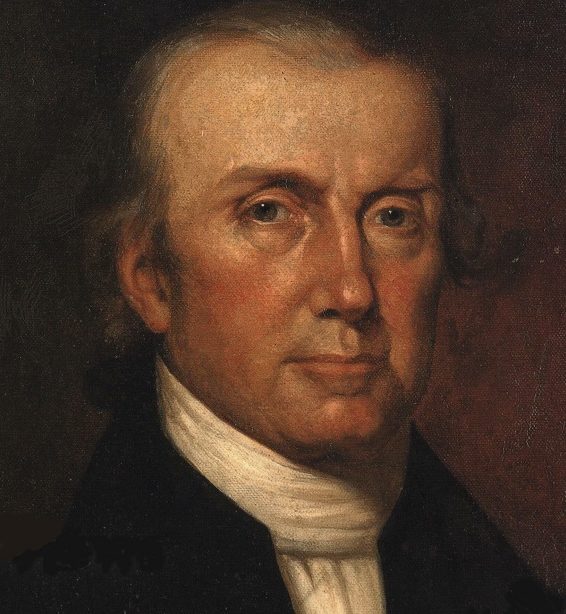Prophet of Encroaching Tyranny
John Taylor of Caroline was a man of the American Revolution. During the fight for independence, he served in the Continental Army and Virginia militia. He left the latter at the end of the war with the rank of lieutenant-colonel. Military life molded his character as it did for so many other men, but the enduring influence on Taylor was not the campaigns of the Continental Army; it was the Spirit of 1776, which gave the Revolution form and substance. The 13 colonies, Taylor realized, were preexisting political communities that owed no allegiance to a foreign government. Virginia, Massachusetts, and the other states had the same claim to govern their own affairs as did England or France. Self-government was the North Star of the Revolution and remained Taylor’s political Polaris throughout his life.
Taylor was born in 1753 in Caroline County, Virginia. His father died in 1758, and his mother sent young John to live with his uncle Edmund Pendleton, a lawyer who would become a leading figure in Virginia politics and eventually serve as president of the state’s Court of Appeals. Pendleton and the boy bonded because Pendleton had lost his own father before his birth and had been raised by a kindhearted planter as his apprentice. Remembering the grace that had been shown him, Pendleton ensured that Taylor received a good education at boarding school and at the College of William and Mary. After college, Taylor studied law in Pendleton’s office and was admitted to the bar in 1774. The war interrupted Taylor’s practice, but after the end of hostilities he excelled in the legal profession.
The practice of law was profitable for Taylor and allowed him to earn substantial fees, which he used to purchase land. Agriculture became his passion, and he left the practice of law as soon as possible. Throughout his life as a planter, Taylor experimented with scientific farming. He shared his knowledge with others through his book Arator (Latin for “Plowman”) and welcomed visits from farmers seeking to learn how to restore depleted soil. Taylor’s genius was not limited to agricultural pursuits but appeared also in his study of republicanism and constitutional structures.
During the ratification controversy, Taylor opposed the Constitution of 1787 and instead preferred a revision of the Articles of Confederation. A pure confederal system, in Taylor’s view, best supported the idea of local self-government that was at the core of the Revolution. The issue of ratification placed him and Pendleton in different political camps; however, Taylor did not actively participate in the ratification battles of 1787-88 because his law practice demanded his full attention.
In 1793, out of respect for his republican principles, the Virginia legislature appointed him to the United States Senate. From this vantage point, Taylor observed a push by Alexander Hamilton and his allies to establish a puissant central government. This was incongruent with the promises made by the Constitution that the new government’s powers would be few and defined and would apply mostly to foreign affairs and foreign commerce.
The efforts by Taylor and other Southerners to oppose Hamiltonian measures, and their retaliation against British insults to American commerce, created a split with Northerners that threatened to dissolve the nascent nation. Massachusetts Senator Rufus King and Connecticut Senator Oliver Ellsworth approached Taylor to discuss dissolving the union. New England depended on Great Britain for credit and commerce, and the Southerners’ pro-French foreign policy in the early 1790s and insistence on a small-scale general government vexed the New Englanders. King and Ellsworth believed that the interests of the two sections were diametrically opposed and that peaceful dissolution would be in the best interests of both parties.
Taylor left the conversation convinced that New England Federalists cared more about mercantile wealth than the republicanism of the Revolution. The encounter also cemented his view that the Federalists, to borrow terms from British political discourse, were a “court” party, ever seeking to expand the ambit of the new government, while Republicans were a “country” party, ever on guard against the slightest hint of corruption or usurpation of power.
After a short stint in the U.S. Senate, the citizens of Caroline County elected Taylor to the Virginia House of Delegates in 1796. In these years, tensions between Jeffersonian Republicans and Federalists increased during the crisis of the Alien and Sedition Acts. Prompted by the quasi-war with France, the Acts broadly interpreted the Constitution in order to vest President John Adams with dictatorial powers over aliens, and to make criticism of the federal government a crime. Previous efforts to expand federal power appeared mild compared to the alien and sedition laws.







Nice homage to Mr. Taylor of Caroline. I await the Broadway tribute to Mr. Taylor: may it awaken New Yorkers’ sensibilities regarding the duplicitous Mr. Hamilton.
Americans are being ruled by the Supreme Court which, if the Constitution mattered at all, should have very few cases before it.
The problems are usually so many books, so little money to buy them and time to the read them. In this case there seems to be no good biography of John Taylor of Caroline, so Mr. Watkins’ summary of Taylor’s career advocating for states rights is welcome and timely. From reading Dumas Malone’s Jefferson and continuing with Mr. Jefferson at Abbeville and other places it’s obvious John Taylor is the Jeffersonian stalwart. At times it seems the other way around, an advantage Taylor may have had by not being in nearly continuous public service for thirty years, as was Jefferson.
I’ve noticed having similar thoughts numerous times since the beginning in visiting the Abbeville Institute. There are things that can’t be found anywhere else – a valuable and entertaining resource.